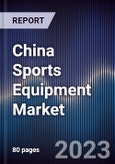Its market segmentations include By Type, By Distribution Channel, and By Region; growth enablers and drivers; challenges and bottlenecks; trends driving adoption trends; regulatory framework; end-user analysis, industry analysis, competitive landscape including competition scenario and market shares of major players. The report concludes with future market projections of each market segmentation and analyst recommendations.
Market Overview:
According to publisher estimates, China Sports Equipment Market grew from approximately RMB ~ Bn in 2017 to approximately RMB ~ Bn in 2022 - is forecasted to grow further into RMB ~ Bn opportunity by 2027F, owing to the rising disposable income of consumers, increasing popularity of sports and fitness activities, and proliferation of online retail channels.China produces up to 60% of the world’s Sports equipment, excluding apparel and shoes. Due to lower labor and production costs, many companies have been sourcing from the country.
In China, 80% of sports goods are consumed by young people, especially those high school students and college students.
Key Trends by Market Segment:
- By Type: Running is the most popular sport in China. The number of participants in marathon events has reached more than 20, 000 in big cities such as Beijing, Guangzhou and Shanghai
- By Distribution Channel: Other specialist retail accounted for the largest proportion of sales in the Chinese sports equipment market in 2020; sales through this channel generated majority of the market revenue
Competitive Landscape
Future Outlook
The China Sports Equipment Market is projected to show significant growth in the coming years. It is expected to be driven by rising awareness of healthy and fit bodies among the Chinese population and the rising disposable income of the population. The main factors driving industry performance have been higher consumption in China, large sporting events hosted by China, people’s increasing pursuit of a healthier lifestyle, and the country’s active involvement in international trade within the World Trade Organization (WTO) framework.Moreover, the majority of the people interested in sports are those with higher education, higher income, and higher social position. This consumer group is spending more money on sports. In recent years, the female consumer market has been seen as a new driver of growth in the sports market. Foreign big brands like Nike or Adidas have high expectations for the female sports market. They are trying to occupy it with integrated marketing communications, offline experience, and digital platforms.
Additional benefits of purchasing an enterprise license:
- TAM/SAM/SOM Analysis
- Customer Cohort Analysis
- Marketing Initiatives
- White Space Opportunity Analysis
- Interactive Data Visualizations
- Customization: 20 Analyst Hours
- 3 Months Post Sales Analyst Support
- Complimentary Update Next Year
- Custom Webinars
Table of Contents
Companies Mentioned (Partial List)
A selection of companies mentioned in this report includes, but is not limited to:
- Nike China
- Anta Sports
- Adidas China
- Li-Ning
- Xtep
- FILA
- Intersport
- Decathlon
- Puma
- Kappa
- Mizuno
- ERKE
- 361
- Taishan Sports Industry Group Co.Ltd
- Bestway
- WeihaiGuangwei (Group) Co., Ltd.
- Doublefish
- DHS-Sports








